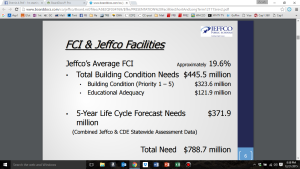They didn’t get it in time for Christmas, but all employees in Jefferson County Public Schools are likely to see a bonus in their paychecks soon after the New Year. Taxpayers can likely plan on non-voter-approved new debt and a bond issue asking for even more money sometime next year, too.
At their work session Thursday, the newly seated “clean slate” of board of education members discussed a one-time compensation bonus totaling $5 million for all employees, issuing between $40-$60 million in Certificates of Participation (COPs) and asking voters for at least $53 million in bonds, but likely much more administrators say.
“When I’m asked what I need, I say $789 million,” said Steve Bell, chief operations officer for the district, who told the board that new construction money doesn’t solve ongoing needs.
Superintendent Dan McMinimee agreed, adding that this package would only solve future enrollment problems.
“This does not include any potential bond items in other places in our district,” he said. “I don’t want anyone to walk away thinking ‘if we do this, we’re good to go,’ because we have several other projects from all across the district that would have to be put into some type of bond package, too, should we choose to move that direction.”
McM inimee told board members they will be asked to make decisions in January on the staff compensation package, and whether or not the board wishes to move forward with COPs to build an 800-student K-8 school at Candelas for $25 million and complete Phase II of Sierra K-6 for $15 million.
inimee told board members they will be asked to make decisions in January on the staff compensation package, and whether or not the board wishes to move forward with COPs to build an 800-student K-8 school at Candelas for $25 million and complete Phase II of Sierra K-6 for $15 million.
COPs are a mechanism to avoid the need for taxpayer approval for new bonds under the Taxpayer’s Bill of Rights (TABOR), which requires all new taxes to be approved by voters.
It allows a third party, often a dummy corporation created by the government itself, to build the new construction and then “lease” the property back to the government.
However, also because of TABOR, a lease cannot last for more than one year, instead coming up for annual renewal until the bonds are paid off. Essentially, future boards could vote against renewal, which could force the district into years of legal battles trying to determine who owns the building and who’s responsible for the debt.
The board will also consider whether to include a $20 million K-6 school at Table Rock Mesa in the COPs or the bond and whether to give employees a 1 percent stipend or a flat $500 to all employees.
“I don’t think that any of our associations would object to providing additional resources,” said Amy Weber, executive director of human resources for the district. “The amount of money is not significant in terms of conversations we’ve had with our associations and what I will call the lean years. … But it’s a good faith effort. It shows that you believe your employees matter. That compensation is important in how we attract and retain employees.”
The money for the compensation would come from $15 million of underspent money the district realized it had last spring from retirements and turnovers in employees. The previous board decided to use that amount, and an additional $3 million in capital transfer money, to build a new K-6 school on Candelas site without incurring new debt.
However, McMinimee and his staff told the new board it just isn’t the most fiscally responsible way to build new schools.
“There is a better way to use that $15 million,” McMinimee said. “We have some significant needs. That is not going to make a huge dent in what those needs are.”
McMinimee said the remaining $10 million would be put back into reserves for now, but admitted the district may come back in the spring and ask to use it on other needs.
“That doesn’t preclude us as the year goes on … to take that $10 million and address specific needs that we have,” McMinimee said. “But we think it’s really important in terms of this staff compensation piece to take a look at where we are in the market. We have some significant areas in our staff where we have some deficits where we need to try to show at least a good faith effort of trying to move towards favorable compensation.”
Kathleen Askelson, chief financial officer for the district, added that the money could also go toward Public Employee Retirement Account (PERA) increases and costs associated with the Affordable Care Act. She said issuing the COPs and repurposing the $18 million was the best use of the money.
“Leveraging debt for long term investments is a very sound business practice,” Askelson said. “Long term assets (should) be funded over time.”
The previous board majority that was recalled in November would not issue COPs because they didn’t want to force the district into debt without voter approval.
The money to pay for the leases on the new buildings comes from the general fund, but Bell told the board the $3 million can be transferred from capital expenses to cover the payment annually.
Board member Amanda Stevens asked if that fund was exempt from the dangers of funding cuts. Bell admitted it was not. When Stevens pressed further, Bell admitted the district lost that annual $3 million capability for transfer in 2009 and didn’t recover it for the first time until this year.
Bell also told the board that they could structure a bond issue—which is not guaranteed to pass—so that it paid off the COPs.
The tactic was something Bell tried to sell to the former board as well. Former president Ken Witt pointed out that it amounted to the board taking out a loan without voter approval, then apologizing to the voters and asking them to give them the money anyway.
If the bond does not pass, the district will still be on the hook for the lease payments of $3 million a year, leaving less resources for such things as teacher compensation and new programs.
McMinimee said the board has to decide where to draw the line of at or over capacity in its buildings.
Board member Brad Rupert, however, said some of the capacity issues might be solved with improving underperforming schools.
“I think we need to be more honest,” Rupert said. “Sometimes it’s just about doing a good job. I’m sorry but we have underperforming schools, and that’s a reality, and it’s a reality we ought to be confronting. It’s a leadership issue; it’s about getting people in the right places and leadership in the schools. Yes we have capacity issues, but we also have problems to solve. So let’s solve the problems too.”


